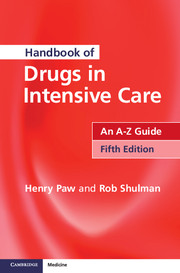Book contents
- Frontmatter
- Contents
- Introduction
- How to use this book
- Abbreviations
- Acknowledgements
- DRUGS: AN A–Z GUIDE
- SHORT NOTES
- Routes of administration
- Loading dose
- Drug metabolism
- Enzyme systems
- Drug excretion
- Drug tolerance
- Drug interactions
- Therapeutic drug monitoring
- Target range of concentration
- Pharmacology in the critically ill
- Cardiopulmonary resuscitation
- Drugs in advanced life support
- Management of acute major anaphylaxis
- Management of severe hyperkalaemia
- Management of malignant hyperthermia
- Sedation, analgesia and neuromuscular blockade
- A practical approach to sedation and analgesia
- Opioid Conversion table
- Management of status epilepticus
- Prevention of delirium tremens and alcohol withdrawal syndrome
- Prevention of Wernicke–Korsakoffsyndrome
- Anti-arrhythmic drugs
- Inotropes and vasopressors
- Bronchospasm
- Anti-ulcer drugs
- Immunonutrition in the ICU
- Corticosteroids
- Short synacthen test
- Bone marrow rescue following nitrous oxide
- Antioxidants
- Post-splenectomy prophylaxis
- Anti-microbial drugs
- Bacterial gram staining
- Antibiotics: sensitivities
- Renal replacement therapy
- Extracorporeal drug clearance: basic principles
- Drug doses in renal failure/renal replacement therapy
- Chemical pleurodesis of malignant pleural effusion
- APPENDICES
- DRUG INDEX
- IV COMPATIBILITY CHART
Anti-ulcer drugs
Published online by Cambridge University Press: 05 November 2014
- Frontmatter
- Contents
- Introduction
- How to use this book
- Abbreviations
- Acknowledgements
- DRUGS: AN A–Z GUIDE
- SHORT NOTES
- Routes of administration
- Loading dose
- Drug metabolism
- Enzyme systems
- Drug excretion
- Drug tolerance
- Drug interactions
- Therapeutic drug monitoring
- Target range of concentration
- Pharmacology in the critically ill
- Cardiopulmonary resuscitation
- Drugs in advanced life support
- Management of acute major anaphylaxis
- Management of severe hyperkalaemia
- Management of malignant hyperthermia
- Sedation, analgesia and neuromuscular blockade
- A practical approach to sedation and analgesia
- Opioid Conversion table
- Management of status epilepticus
- Prevention of delirium tremens and alcohol withdrawal syndrome
- Prevention of Wernicke–Korsakoffsyndrome
- Anti-arrhythmic drugs
- Inotropes and vasopressors
- Bronchospasm
- Anti-ulcer drugs
- Immunonutrition in the ICU
- Corticosteroids
- Short synacthen test
- Bone marrow rescue following nitrous oxide
- Antioxidants
- Post-splenectomy prophylaxis
- Anti-microbial drugs
- Bacterial gram staining
- Antibiotics: sensitivities
- Renal replacement therapy
- Extracorporeal drug clearance: basic principles
- Drug doses in renal failure/renal replacement therapy
- Chemical pleurodesis of malignant pleural effusion
- APPENDICES
- DRUG INDEX
- IV COMPATIBILITY CHART
Summary
Critically ill patients are highly stressed and this leads to an increased incidence of peptic ulceration. The risk of stress ulceration is increased in the presence of:
• Sepsis
• Head injury
• Major surgical procedures
• Multiple trauma
• Severe burn injuries
• Respiratory failure
• Severe hepatic failure
• Severe renal failure
Routine use of anti-ulcer drugs to all patients in an ICU is unnecessary. Use should be restricted to those who have the risk factors described above and should be stopped when patients are established on enteral feeding.
Patients who have a coagulopathy or on NSAIDs, SSRIs, clopidogrel or steroids (whether or not enterally fed) should be covered with a proton pump inhibitor (PPI) or ranitidine. The routine use of PPIs in the ICU is not justified; these are sometimes unintentionally continued long-term on discharge from ICU and are associated with Clostridium difficile infection.
- Type
- Chapter
- Information
- Handbook of Drugs in Intensive CareAn A-Z Guide, pp. 285Publisher: Cambridge University PressPrint publication year: 2014



